|
|
|
|
|
|
|
|
Today's Congressional Action:
The Senate is expected to hold a pro forma session. The House is consider legislation to "adapt to changing crude oil market conditions."
|
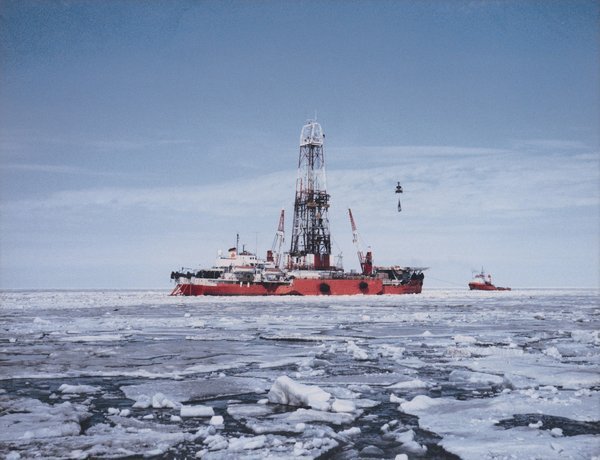 UNESCO Sees Bright Side to Shell's Arctic Pullout. Shell's decision to end its program to drill for oil in Arctic waters off Alaska is being cheered by one international organization. Shell's drilling in the Chukchi Sea threatened Russia's Wrangel Island Reserve, an ecologically rich site that is the only designated World Heritage site in the Arctic, said the United Nations Educational, Scientific and Cultural Organization, also known as UNESCO. "This Arctic jewel, and the wealth of wildlife it supports, were threatened by Shell's Chukchi Sea operations," UNESCO said in a statement released Wednesday. Alaska Dispatch News UNESCO Sees Bright Side to Shell's Arctic Pullout. Shell's decision to end its program to drill for oil in Arctic waters off Alaska is being cheered by one international organization. Shell's drilling in the Chukchi Sea threatened Russia's Wrangel Island Reserve, an ecologically rich site that is the only designated World Heritage site in the Arctic, said the United Nations Educational, Scientific and Cultural Organization, also known as UNESCO. "This Arctic jewel, and the wealth of wildlife it supports, were threatened by Shell's Chukchi Sea operations," UNESCO said in a statement released Wednesday. Alaska Dispatch News
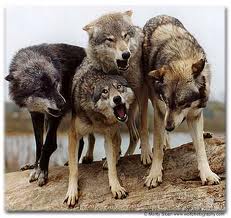 Swedish Wolves Need More Genetic Diversity: Study. A new report commissioned by the Swedish Environmental Protection Agency says Sweden needs at least 300 wolves to maintain a healthy population. But it also adds that new blood is needed for the pack. Maria H÷rnell Willebrand heads up the wildlife analysis department at the agency. She says the report was launched at the request of the government, which wanted to know what the minimum necessary population was to ensure the long-term health of the species and what the socio-economic consequences of having that population would be. Alaska Dispatch News Swedish Wolves Need More Genetic Diversity: Study. A new report commissioned by the Swedish Environmental Protection Agency says Sweden needs at least 300 wolves to maintain a healthy population. But it also adds that new blood is needed for the pack. Maria H÷rnell Willebrand heads up the wildlife analysis department at the agency. She says the report was launched at the request of the government, which wanted to know what the minimum necessary population was to ensure the long-term health of the species and what the socio-economic consequences of having that population would be. Alaska Dispatch News
Defense Bill Passes With Measure Sen. Sullivan Hopes Will Halt JBER Cuts. The U.S. Senate on Wednesday passed the annual defense authorization bill, with a provision by Alaska Sen. Dan Sullivan requiring an "Arctic Operation Plan." The O-PLAN is a key part of Sullivan's effort to stave off the Army's announced cut of thousands of troops from Joint Base Elmendorf-Richardson. Sullivan argues the Pentagon can't make the JBER cuts before it has a plan to identify which assets it needs to defend the region. KTOO
Commission Calls for Proposals to Spend 2012 Salmon Funds. Morris News Service-Alaska/Alaska Journal of Commerce The Pacific States Marine Fisheries Commission is asking for proposals on how to spend $2.2 million in federal disaster funds geared toward salmon research in Cook Inlet and the Yukon-Kuskokwim region. The funding opportunities will be welcome in wake of state budget cuts that claimed the Chinook Salmon Research Initiative. The program was slated to give $30 million over a period of years for in-river chinook studies, but only $15 million was used before Gov. Bill Walker's administration cut the funding. The Peninsula Clarion
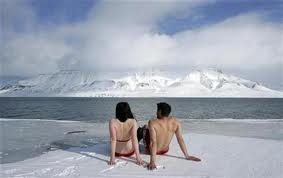 Arctic Tourism Hot Topic at Industry Convention. Alaska gets close to 2 million visitors a year,and more and more of them are visiting the Arctic Circle and beyond. That's what a large audience at this week's Alaska Travel Industry Association convention in Juneau heard during a "Tourism in the Arctic" panel discussion. Richard Beneville is Nome's new mayor. He also owns his own tour company, Nome Discovery Tours. "I'm going into my 24th season," Beneville said. He said Nome attracts tourists for many reasons - its sport fishing, hunting, "and birding. Oy gevalt! Birds! A hundred-and-seventy migratory species that come through May 15 to June 15. We just had the cranes go out. You could look out and see 100,000 cranes in different formations. Very exciting." KTOO Arctic Tourism Hot Topic at Industry Convention. Alaska gets close to 2 million visitors a year,and more and more of them are visiting the Arctic Circle and beyond. That's what a large audience at this week's Alaska Travel Industry Association convention in Juneau heard during a "Tourism in the Arctic" panel discussion. Richard Beneville is Nome's new mayor. He also owns his own tour company, Nome Discovery Tours. "I'm going into my 24th season," Beneville said. He said Nome attracts tourists for many reasons - its sport fishing, hunting, "and birding. Oy gevalt! Birds! A hundred-and-seventy migratory species that come through May 15 to June 15. We just had the cranes go out. You could look out and see 100,000 cranes in different formations. Very exciting." KTOO
|
Legislative Action
No Arctic legislation was formally considered yesterday.
|
|
Future Events
The Arctic Circle is the largest global gathering on the Arctic. It is attended by heads of state and governments, ministers, members of parliament, officials, experts, scientists, entrepreneurs, business leaders, indigenous representatives, environmentalists, students, activists, and others from the growing international community of partners and participants interested in the future of the Arctic. The Arctic Circle highlights issues and concerns, programs, policies and projects; it provides platforms for dynamic dialogue and constructive cooperation. While the plenary sessions are the responsibility of the Arctic Circle, the breakout sessions are organized by various participating partners in their own name and with full authority over the agenda and the choice of speakers.
Penn State University will host an afternoon panel of national experts in the Arctic and in US interests in the region. Building on the law of the sea expertise of VADM James Houck (former Navy Judge Advocate General and now Interim Dean of the Law School and School of International Affairs at Penn State) and the knowledge of the changing Arctic environment of RADM David Titley (former head of the Navy's Task Force Climate Change and now professor from practice in the Department of Meteorology), and Fran Ulmer, Chair of the US Arctic Research Commission (keynote speaker), the panel brings together experts in science, law, policy, and Arctic diplomacy. We see these experts individually at events in Washington, but Penn State is doing a great service in bringing them altogether at one event in an region that seldom gets such first hand expertise.
The Polar Oceans and Global Climate Change, November 3-6, 2015 (La Jolla, California USA). The American Polar Society will host this Symposium at Scripps Institution of Oceanography. A flyer with a partial list of presenters is available on the Society's website (americanpolar.org) and from the Society's Membership Chairman by email.
Forum for Arctic Modeling and Observational Synthesis Meeting, November 3-6, 2015 (Cape Cod, MA, USA). On November 3rd, the 2015 School for young scientists will consider "Regional Oceanography of the Arctic marginal seas" with lectures covering major features of atmospheric, sea ice and oceanographic regimes of the: Bering, Chukchi, Beaufort, East-Siberian, Laptev Sea, Kara, Barents and Nordic seas. On November 4-6, the meeting portion will summarize project accomplishments for the last 3 years of activities and will focus on the formulation of scientific questions and directions for FAMOS future research (2016-2019) to: (a) improve Arctic modeling, employing very high resolution models; (b) develop and test new arctic monitoring/observing systems and (c) improve predictions of Arctic environmental parameters with reduced uncertainties.
Due North: Next Generation Arctic Research & Leadership, November 5-8, 2015 (Calgary, Alberta, Canada). The Association of Canadian Universities for Northern Studies (ACUNS) will convene an interdisciplinary conference of early career scientists working on Arctic issues. Topics will include: Arctic Communities, Arctic Sustainable Development, Arctic Wildlife, Ecosystem and Biodiversity, Arctic Food Security, Arctic Landscapes, Climate Change and Adaptation, Disaster Risk Management, Policy, Politics and Leadership, Arctic Environment (Data and Techniques), Arctic Resources, and Future of Arctic.
Matchpoints Seminar, November 12-13, 2015 (Aarhus, Denmark). The purpose of the conference is to provide a forum for policy-makers and academics to deliberate on how the security, resilience and sustainability of the globalized Arctic region and its peoples may be enhanced, and what instruments of governance may most suitably contribute. The conference will spell out (1) how the different relevant dimensions of security (military, economic, environmental, energy and human security) manifest themselves in the governing / governance arrangements in the Arctic; (2) how the challenges associated with each manifest themselves, individually and together; and (3) what forms of governing arrangements can best help to address the challenges. The conference will also focus on (4) how the Nordic countries and nations, including Greenland, the Faroe Islands and Aaland Islands, may contribute to the peace, stability and prosperity of the Arctic region through collaborative efforts based on their shared social, human, environmental and democratic values.
Arctic Observing Open Science Meeting, November 17-19, 2015 (Seattle, Washington). The Arctic Observing Open Science Meeting will be 2.5 days and held at the Hyatt at Olive 8 in Seattle, Washington. The conference will bring together individuals and teams involved in the collection, processing, analysis, and use of observations in the Arctic - from academia, agencies, industry, and other organizations. The meeting will be convened as a combination of plenary talks, parallel science sessions, and a poster session. The agenda and registration information will be forthcoming.
In the Spirit of the Rovaniemi Process 2015, November 24-26, 2015 (Rovaniemi, Lapland, Finland).When the Arctic Environmental Protection Strategy, the so-called Rovaniemi Process, was adopted in 1991, it aimed at overcoming divisions and turning the zone of Cold War military tensions into a region of peace and co-operation. In this joint effort focusing on the protection of environment, and later, sustainable development, the Arctic states supported by indigenous organizations laid grounds for institutionalized collaboration and the emergence of Arctic regional identity. The second international conference will bring together decision-makers, scholars, artists, designers and students to address these questions and discuss the Arctic in global, regional and local perspectives.
Arctic Encounter Paris (AEP 2015), December 11-12, 2015 (Paris, France) (During the UN Convention on Climate Change - COP21). The Arctic Encounter Paris will take place at the French Senate at Luxembourg Palace and the 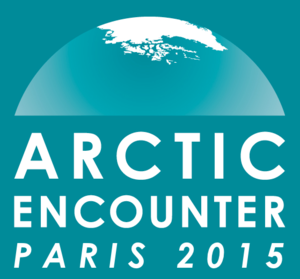 French Military College, ╔cole Militaire, in Paris, France, on the final days of the monumental United Nations Convention on Climate Change (COP21) where thousands of global citizens and government delegates will be gathered to deliberate the world's response to our changing planet in Paris. The AEP is the only Arctic policy side event currently planned to take place during the UN Convention. A reception will take place following the closing panel. French Military College, ╔cole Militaire, in Paris, France, on the final days of the monumental United Nations Convention on Climate Change (COP21) where thousands of global citizens and government delegates will be gathered to deliberate the world's response to our changing planet in Paris. The AEP is the only Arctic policy side event currently planned to take place during the UN Convention. A reception will take place following the closing panel.
This symposium is part of an ongoing initiative of the National Academies of Science Polar Research Board to expand public understanding of why the dramatic changes affecting the Arctic region ultimately matter to us all. The agenda features engaging presentations and discussions with top Arctic science and policy experts, and displays and interactive exhibits that illustrate Arctic change and its global impacts. The event is free and open to the public. There are sponsorship opportunities, and a call for exhibitor applications (by Oct.31, 2015). Audience space is limited, so register today; and please encourage your friends, neighbors, and colleagues to participate-as our goal is to reach well beyond the small circle of specialists who typically attend Arctic-themed events in the DC area. The U.S. Arctic Research Commission is helping to sponsor this event.
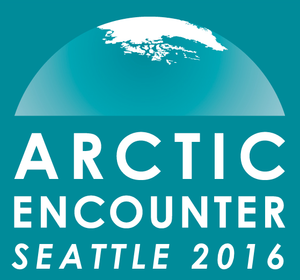 Building upon the preceding Arctic Encounter event in Paris, the third annual Arctic Encounter Symposium (AES) in Seattle, Washington will convene policymakers, industry leaders, and leading experts to confront the leading issues in Arctic policy, innovation, and development. As the largest annual Arctic policy event in the United States, the AES mission is to raise awareness, engage challenges, and develop solutions for the future of a region and a people. The two-day program includes two keynote luncheons, expert plenary sessions, break out sessions, a networking cocktail reception and seated dinner. A closing reception will take place at the conclusion of the program. Building upon the preceding Arctic Encounter event in Paris, the third annual Arctic Encounter Symposium (AES) in Seattle, Washington will convene policymakers, industry leaders, and leading experts to confront the leading issues in Arctic policy, innovation, and development. As the largest annual Arctic policy event in the United States, the AES mission is to raise awareness, engage challenges, and develop solutions for the future of a region and a people. The two-day program includes two keynote luncheons, expert plenary sessions, break out sessions, a networking cocktail reception and seated dinner. A closing reception will take place at the conclusion of the program.
|
|

  
4350 N. Fairfax Drive, Suite 510
Arlington, VA 22203, USA
External links in this publication, and on the USARC's World Wide Web site ( www.arctic.gov) do not constitute endorsement by the US Arctic Research Commission of external Web sites or the information, products or services contained therein. For other than authorized activities, the USARC does not exercise any editorial control over the information you may find at these locations. These links are provided consistent with the stated purpose of this newsletter and the USARC Web site.
|
|
|
|
|
|
|
|
|